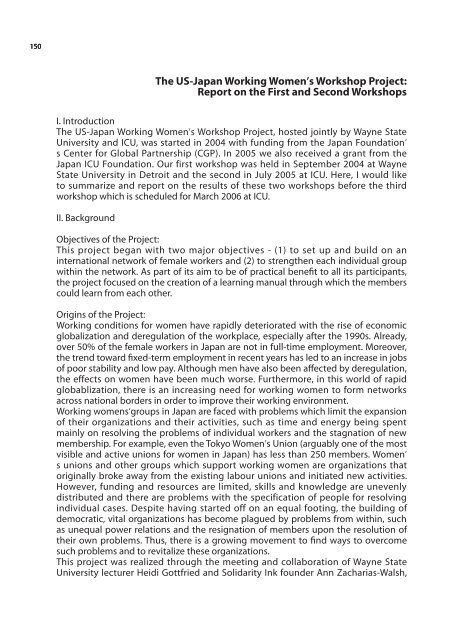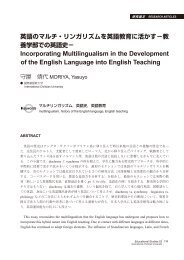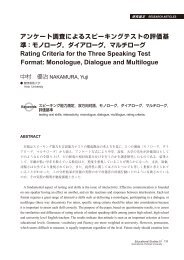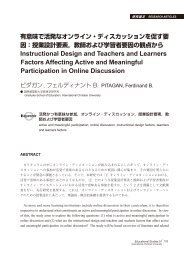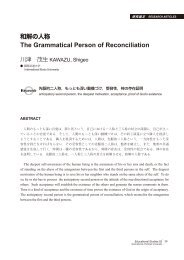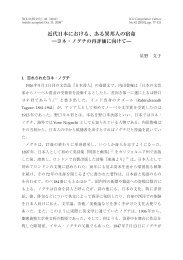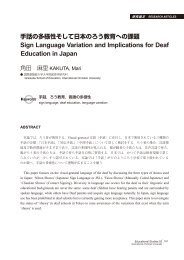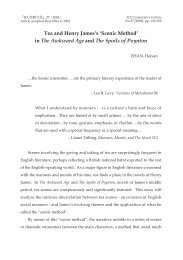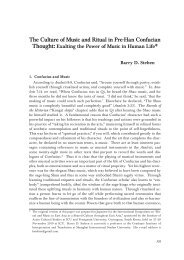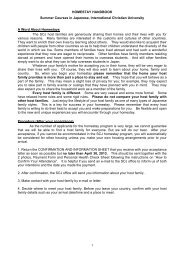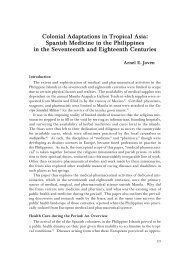Untitled - subsite - å½éåºç£æ大å¦
Untitled - subsite - å½éåºç£æ大å¦
Untitled - subsite - å½éåºç£æ大å¦
Create successful ePaper yourself
Turn your PDF publications into a flip-book with our unique Google optimized e-Paper software.
150<br />
The US-Japan Working Womens Workshop Project:<br />
Report on the First and Second Workshops<br />
I. Introduction<br />
The US-Japan Working Womens Workshop Project, hosted jointly by Wayne State<br />
University and ICU, was started in 2004 with funding from the Japan Foundation<br />
s Center for Global Partnership (CGP). In 2005 we also received a grant from the<br />
Japan ICU Foundation. Our first workshop was held in September 2004 at Wayne<br />
State University in Detroit and the second in July 2005 at ICU. Here, I would like<br />
to summarize and report on the results of these two workshops before the third<br />
workshop which is scheduled for March 2006 at ICU.<br />
II. Background<br />
Objectives of the Project:<br />
This project began with two major objectives - (1) to set up and build on an<br />
international network of female workers and (2) to strengthen each individual group<br />
within the network. As part of its aim to be of practical benefit to all its participants,<br />
the project focused on the creation of a learning manual through which the members<br />
could learn from each other.<br />
Origins of the Project:<br />
Working conditions for women have rapidly deteriorated with the rise of economic<br />
globalization and deregulation of the workplace, especially after the 1990s. Already,<br />
over 50% of the female workers in Japan are not in full-time employment. Moreover,<br />
the trend toward fixed-term employment in recent years has led to an increase in jobs<br />
of poor stability and low pay. Although men have also been affected by deregulation,<br />
the effects on women have been much worse. Furthermore, in this world of rapid<br />
globablization, there is an increasing need for working women to form networks<br />
across national borders in order to improve their working environment.<br />
Working womensgroups in Japan are faced with problems which limit the expansion<br />
of their organizations and their activities, such as time and energy being spent<br />
mainly on resolving the problems of individual workers and the stagnation of new<br />
membership. For example, even the Tokyo Womens Union (arguably one of the most<br />
visible and active unions for women in Japan) has less than 250 members. Women<br />
s unions and other groups which support working women are organizations that<br />
originally broke away from the existing labour unions and initiated new activities.<br />
However, funding and resources are limited, skills and knowledge are unevenly<br />
distributed and there are problems with the specification of people for resolving<br />
individual cases. Despite having started off on an equal footing, the building of<br />
democratic, vital organizations has become plagued by problems from within, such<br />
as unequal power relations and the resignation of members upon the resolution of<br />
their own problems. Thus, there is a growing movement to find ways to overcome<br />
such problems and to revitalize these organizations.<br />
This project was realized through the meeting and collaboration of Wayne State<br />
University lecturer Heidi Gottfried and Solidarity Ink founder Ann Zacharias-Walsh,


